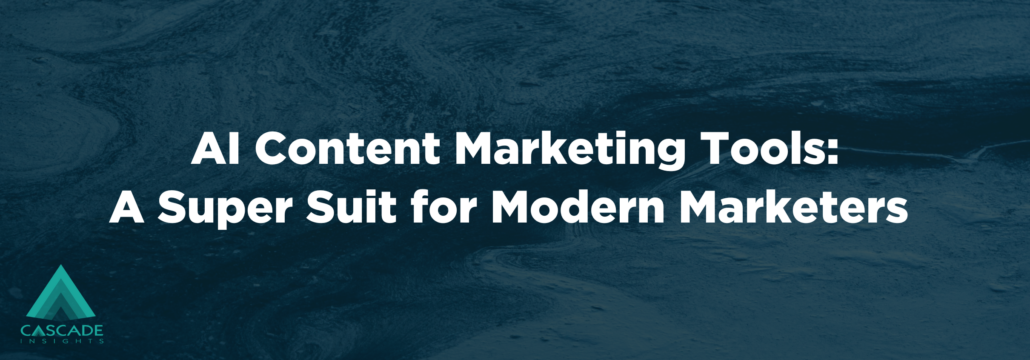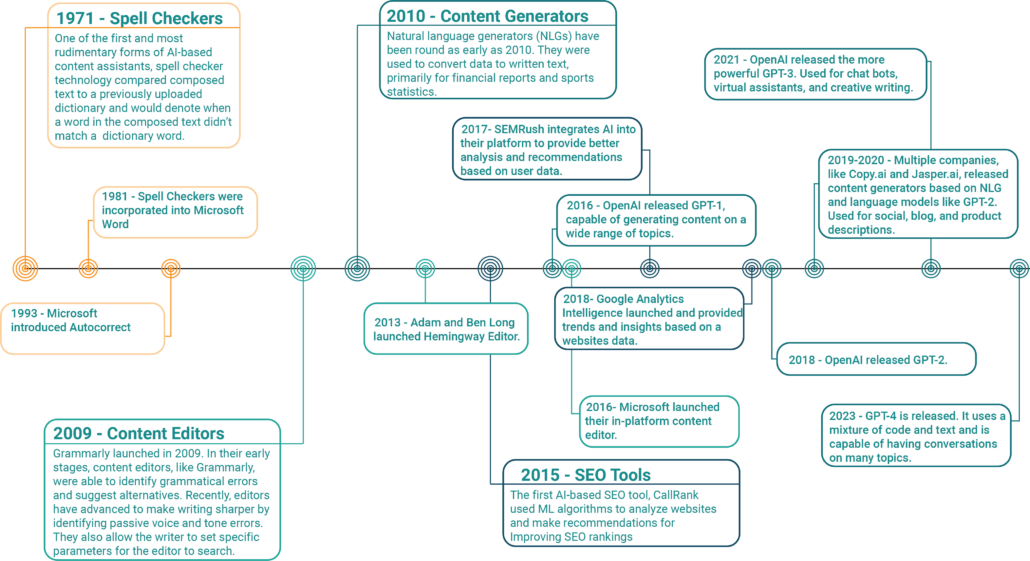B2B marketers hold divergent views on the recent advancements in AI-based content marketing tools. On the one hand, some marketers embrace these tools as a way to accelerate the creative process. For these marketers, these AI-based tools act as a content creation super suit that helps them in various aspects of their job, such as:
- Brainstorming topics for blogs.
- Synthesizing information for background research.
- Finding alternative ways to paraphrase statements for taglines and other short-form copy.
- Refining their tone in accordance with brand guidelines.
- Creating unique imagery that stands out from the bad stock images that plague most of today’s content.
Other marketers are reluctant to use these tools because they blur the line between whether a human or a machine owns the creative output. They see these tools as an artificial shortcut to creativity. In some sense, they’re right. AI cannot replace a human marketer’s capacity for storytelling and creativity. At the same time, the resistance generated by these marketers ultimately limits their ability to perform at their highest potential.
To illustrate this last point, let’s consider a hypothetical longitudinal study of two B2B marketers. The first is an early adopter of various AI-based content marketing tools since 2010, starting with Grammarly. The second ignores, or at least disparages, every AI tool that comes to market.
Before diving into their journeys, however, let’s first take a look at the history of AI tools that impact the creative process, as this impact goes farther back than 2023.
A Brief History of AI Writing Tools
Artificial intelligence (AI) is defined as “the theory and development of computer systems able to perform tasks that normally require human intelligence” (Oxford English Dictionary). AI, as we know it today, is relatively new, but it has existed in some less sophisticated forms for decades. And it’s been helping to shape the creative process that entire time.
The Impact of AI Tools: A Tale of Two Marketers
To understand the impact of embracing or ignoring AI on a B2B marketer career progression and skill development, let’s look at two hypothetical individuals: AI Allie and Laggard Larry.
Both Allie and Larry graduated in 2005 and entered the field of digital marketing. However, their approaches diverged significantly. Allie embraced a super-suit powered by AI-based technologies, while Larry chose to rely solely on his own knowledge and skills.
Marketer 1: AI Allie
In 2005, Allie began her career as a marketer. Her role consisted predominantly of creating email and website copy. At the time, she used the latest tools available from Word and other similar word processors. Rudimentary AI-based tools like spell checkers and autocorrect made her confident in her ability to create clean, error-free content.
Fast forward to 2010, Allie joined a new company with a tech-forward CMO. He introduced the team to Grammarly to help them produce cleaner, more concise content. Allie was initially skeptical, worried that Grammarly might take away from her writing style. However, Allie discovered when using Grammarly that she received fewer edits from her team lead on what she wrote, reducing the time spent on revisions.
At the same time, Allie’s team was trying to improve organic search rankings. They started using tools like Google Analytics to gain insights into visitor behavior on their website. These insights helped educate the marketing team as to how they could optimize the website. When Google and SEMrush released AI enhancements for SEO analysis in 2017 and 2018, Allie’s team was already immersed in these types of tools and quickly began to use them to their advantage.
Google’s “Analytics Intelligence” enabled Allie’s team to track individual visitor behavior and use predictive analytics. Predictive analytics let the team segment audiences more effectively, identify new audiences based on their similarities with current audiences, and create more targeted, personalized content to appeal to any target audience.
Allie’s team also used SEMrush’s AI capabilities to enhance their SEO efforts. By leveraging SEMrush, the team was able to target more relevant keywords and that led to increased and more relevant website traffic.
In 2022, Allie explored how AI content assistants like Jasper and Copy AI could help increase the team’s productivity. While initially skeptical about the promise of creating a blog from an idea in seconds, Allie realized their potential for generating “seed” content that her team could shape into something greater. So, while these tools couldn’t quite yet deliver fully on the promise they pushed, they could accelerate the team’s content creation efforts in a few foundational ways.
Today, as a seasoned digital content marketer with over 15 years of experience, Allie is adept at leveraging data and insights to drive impactful marketing strategies. She has consistently embraced technology throughout her career, equipping herself and her team with tools that accelerate their efforts.
Marketer 2: Laggard Larry
Now, let’s turn our attention to Larry. When Larry started his first job in 2005, he, like Allie, took advantage of spell check and autocorrect features in Microsoft Word to create clean email and website copy.
However, in 2010 when more sophisticated content editors, such as Grammarly, became popular, Larry shunned them. He felt uncomfortable with a non-human editor telling him how to improve his content. Instead, Larry and his team continued using their internal editing process, where the team lead would review his writing and redline it with edits. Despite going through multiple rounds of edits, Larry and his managers were happy with the style and personality of his finalized pieces.
However, Larry’s team realized that despite their best efforts, what they wrote wasn’t ranking well in Google, prompting them to start doing keyword research. Instead of investing in a tool to guide them, Larry’s manager initiated a time-consuming project where they compared their messaging with competitors’, identified gaps, and enlisted the sales teams to better understand customer search preferences. It was an arduous process that took months. But they finally ended up with a spreadsheet of more than two hundred key phrases they needed to target.
Then, they began optimizing their content and website for these keywords, resulting in some growth in website traffic and leads. However, the outcome fell short of their expectations, considering the effort spent gathering and organizing the information.
In 2022, Larry assumed leadership of the marketing team. During a team meeting, the topic of ChatGPT and LLM enabled tools arose. One of the marketers joked that the AI takeover in marketing had begun. Larry dismissed the remark, asserting that AI tools cannot replace human ingenuity and flair.
Today Larry, like Allie, is a veteran digital content marketer. Yet, after 15 years, his processes and mindset haven’t changed much. He spends hours each week:
- Manually sifting through spreadsheets trying to divine what customers might search for regarding his company’s products and services.
- Reviewing and editing grammar, phrasing, and trying to condense content.
- Managing a content review process that involves only humans, and many layers of review.
The AI Difference
Throughout his career, Laggard Larry missed many opportunities to empower himself and his team with tools that could make them more effective at their jobs. In fact, nearly 20 years into his career, he’s still primarily guessing at what will work to attract and convert leads.
By contrast, AI Allie’s super suit makes it easy for her to both outpace and outperform Larry, at every step.
Suit Up: Boost Your B2B Marketing Using AI
Here are just a few of the ways Allie uses her super suit to create meaningful marketing efforts.
Idea Generation
Crafting exceptional content starts with a brilliant idea. Generating great ideas can be challenging, particularly in niches where new or unique ideas are scarce. Even when that isn’t the case, sometimes you just don’t have the mental energy to conjure up an exciting idea. Call it a symptom of the human condition, that sometimes even a Redbull or double espresso can’t fix.
Fortunately, AI-powered content tools can help you find unique topics that resonate with your audience. Moreover, tools like ChatGPT can effortlessly steer you towards intriguing content creation paths, providing valuable guidance along the way.
For example:
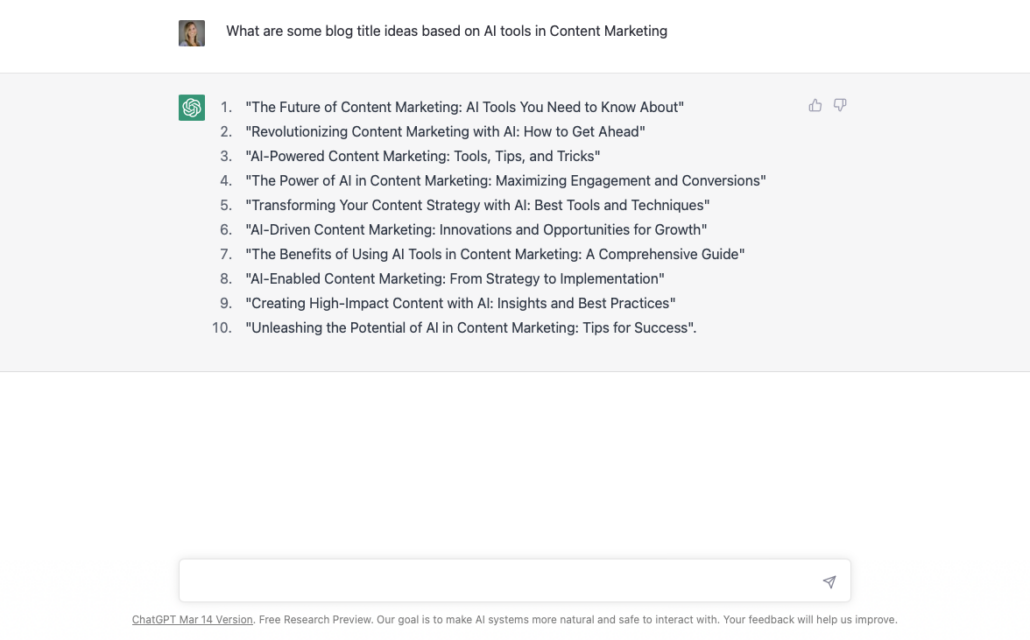
Research
Once you have a compelling idea and perspective, the next step is to find credible sources of information that substantiate your unique viewpoint.
For example, ChatGPT allowed me to quickly develop a comprehensive timeline of AI-enabled tools, and it do so far quicker than stitching together results from various Google searches.
When I needed more detail on specific tools, I asked follow-up questions, which provided me with detailed answers. Even after fact-checking the information via Google searches, ChatGPT significantly reduced the amount of time I needed to to invest in the research process.
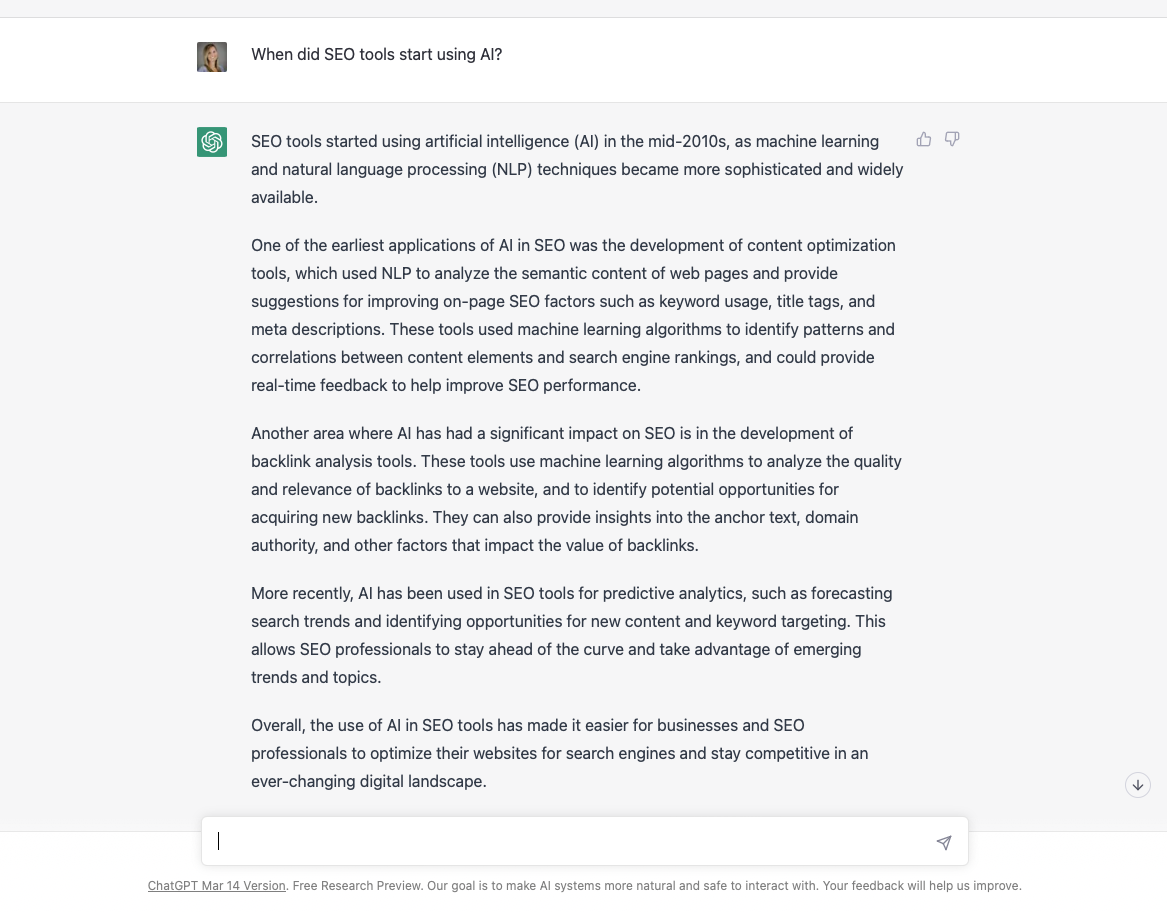
Outline/First Drafts
But can these tools expedite the process of transforming an idea to a first draft?
Indeed, many AI-based tools released in the last few months streamline the process of going from outline to rough draft in a few clicks. Some even allow you to start with a title for your piece, leaving the tool to handle the rest.
An excellent example of a tool that supports these types of workflows is Copy.ai. Their blog wizard enables you to swiftly progress from idea to outlining to crafting the initial draft in a very short timeframe.
Finally, even if the initial output generated by a tool like Copy.ai isn’t precisely what you want, you can always refine the results by fine-tuning inputs and parameters to reach a more ideal state.
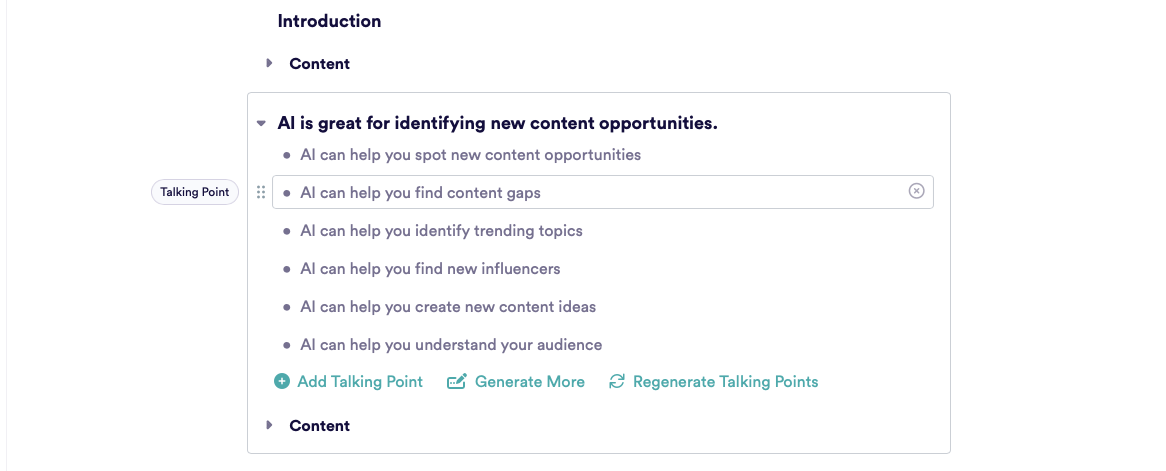
Don’t Trip Over Your Cape
A super suit is an accessory, not a superhero. But even so, super heroes who know how to use their super suit well, like Batman, Buzz Lightyear, and IronMan, tend to accomplish great things.
Hence, AI-based tools still need humans to drive them. Hopefully that human is a great marketer who already has the right skills and just hopes to reach a new level of achievement.
Yet, a super-suit can create challenges. For example, the first time IronMan put on his suit, things didn’t go as planned.
Here are just a few of those challenges.
Generic Language/Lack of Creativity – Even the most capable AI-based content tool tends to write copy that is grammatically correct, but it tends to lack the creative finesse that a human touch can bring. These tools aren’t as adept at leveraging analogies or metaphors as well as a human might.
Inaccuracies – By definition, tools such as ChatGPT, and GenML are only as good as the data they are given to leverage. Given everything on the internet isn’t true, this can create what the OpenAI team calls “hallucinations” whereby tools like ChatGPT provide false or misleading information. Given you don’t want your writing based on hallucinations (typically), you’ll need to be on the lookout for these types of AI daydreams.
Lacking Source Citations – AI-based tools don’t tend to cite their sources. Even if the generated content is valid, the absence of source citations hinders its credibility. If an AI-based tool says that 65 percent of marketers are using AI tools to boost their content pipeline but doesn’t cite where that information originated from, it’s crucial that you source that fact. This ensures that your inclusion of that data point is valid and credible.
Put on Your Marketing Super Suit
AI-based content assistants are continuing to evolve, and a marketer who fails to get used to wearing a super-suit will be left behind. Worse yet, while you’re falling behind personally, your team, company, clients, or partners will feel the pain as well.
Instead of falling behind, we suggest that you embrace tools like Google Bard, ChatGPT, Copy.AI, Jasper.AI, and many, many others. Not blindly, but wisely. For those who do, their work will be easier, more well rounded, powerful, and completed quickly.
And to us that’s a fair trade, even if it means working with a partner that isn’t quite – well let’s say – human.

